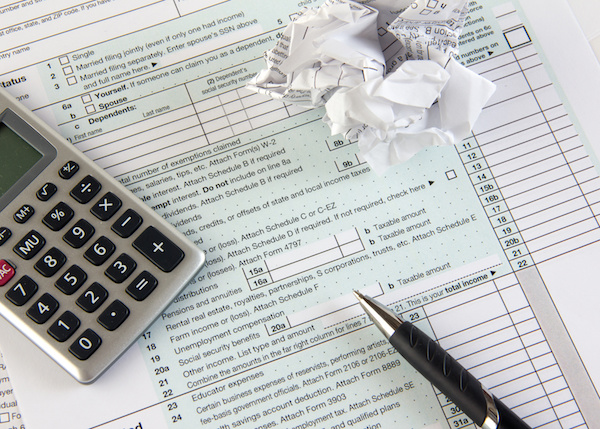Making sure to file your taxes is important, but some people watch that deadline fly by without even noticing it. For some reason or another, they don’t file (or pay what they owe) by the deadline, and there are definitely some consequences to that. Here are some things that can happen as a result of not filing your taxes:
Pay a penalty fee: There are two kinds of “not doing” your taxes — failing to file and failing to pay. If you fail to file, you get hit with a penalty of 5 percent of the tax owed, up to five months out, with a minimum penalty of $135, or as much as 100 percent of the tax owed — whichever is less. If you don’t pay, you’re typically charged a penalty.
Receive a federal tax lien. It sounds technical, but basically, a lien is a claim the IRS makes to your property. This claim, however, isn’t another notice you can shove in a drawer. According to IRS Publication 594, a lien is a public declaration of the agency’s claim to your property in relation to your other creditors. Not only may it be filed to employers, landlords, and creditors, but the lien can make you …
Lose ground on your credit report. An unpaid debt to the IRS is just like an unpaid debt to anyone else, and it will appear on your credit report. People don’t realize that your credit report reflects your tax liens as much as any other outstanding debt. We won’t even pretend that it could be considered “good debt.”
Have your property seized. A lien is a claim to your property; a levy is the actual taking of it. IRS Publication 594 makes it clear that in some cases, the agency can appropriate your house or car, not to mention your income or bank account. They might restrain themselves if it’s agreed that you’re suffering “economic hardship,” which means their seizure would hinder your ability to meet “basic, reasonable living expenses.” Plus, the publication reads, “If there’s money left over from the sale [of your assets] after paying off your tax debt, we’ll tell you how to get a refund.”
Receive a summons. If the IRS is having trouble sorting out the taxes you owe, you could get a summons — that’s a legal requirement to appear — to meet with an IRS officer, and bring appropriate records, documents, and possibly even testify. It won’t necessarily be you who is asked to meet with the agency: A third party with information relevant to your case, such as a record keeper from a financial institution, could be summoned instead. If the IRS is simply gathering info, you’ll be informed of the third-party summons, but if it’s in reference to money it’s already clear you owe, you might not even find out.
Declare bankruptcy. Let’s hope it doesn’t come to this. People who might declare bankruptcy are the people who couldn’t pay their taxes because they couldn’t afford to pay their mortgage or expenses and get caught in a bit of a bind. Usually it’s people who are caught for three or four years not filing, spending the money they didn’t pay the IRS on things to try and stay above water. Remember that bankruptcy isn’t magic: While in certain cases, a tax debt can be discharged, if it has turned into a tax lien, it might not be erased. Instead the IRS will generally suspend the debt and seek to collect it after bankruptcy.
Deal with the IRS for a decade. Did we mention that the government has the right to pursue unpaid taxes for 10 years? While there are certain appeals and exceptions for individual cases, if you’ve been a negligent taxpayer (or rather, non-taxpayer) you can look forward to a long and close relationship with the IRS.
However, there’s hope.
The absolute best thing you can do if you’ve neglected to file or pay is reach out to the IRS immediately. It may seem counterintuitive, but the agency is more likely to look kindly on someone who admits they’re off track and wants to work it out than someone who has been lining the litter box with their notices. You may be able to negotiate a payment plan or even a reduction of the total owed.
If you have concerns about your taxes, and how to best address them, contact France Law Firm today. We’ll be happy to assist with any tax preparation to prevent these catastrophes from happening in the future.






















